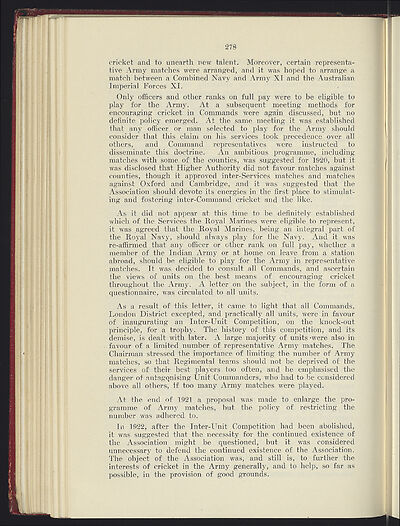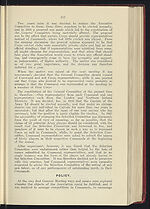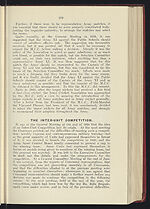1931
(292)
Download files
Complete book:
Individual page:
Thumbnail gallery: Grid view | List view

.11
I
278
cricket and to unearth new talent. Moreover, certain representa-
tive Ariny matches were arranged, and it was hoped to arrange a
match between a Combined Navy and Army XI and the Australian
Imperial Forces XI.
Only officers and other ranks on full pay were to be eligible to
play for the Army. At a subsequent meeting methods for
encouraging cricket in Commands were again discussed, but no
definite policy emerged. At the same meeting it was established
that any officer or man selected to play for the Army should
consider that this claim on his services took precedence over all
others, and Command representatives were instructed to
disseminate this doctrine. An ambitious programme, including
matches with some of the counties, was suggested for
1920,
but it
was disclosed that Higher Authority did not favour matches against
counties, though it approved inter-Services matches and matches
against Oxford and Cambridge, and it was suggested that the
Association should devote its energies in the first place to stimulat-
ing and fostering inter-Command cricket and the like.
As it did not appear at this time to be definitely established
which of the Services the Royal Marines were eligible to represent,
it was
.
agreed that the Royal Marines, being an integral part of
the Royal Navy, should always play for the Navy. And it was
re-affirmed that any officer or other rank on full pay, whether a
member of the Indian Army or at home on leave from a station
abroad, should be eligible to play for the Army in representative
matches. It was decided to consult all Commands, and ascertain
the views of units on the best means of encouraging cricket
throughout the Army. A letter on the subject, in the form of a
questionnaire, was circulated to all units.
As a result of this letter, it came to light that all Commands,
London District excepted, and practically all units, were in favour
of inaugurating an Inter-Unit Competition, on the knock-out
principle, for a trophy. The history of this competition, and its
demise, is dealt with later. A large majority of units -were also in
favour of a limited number of representative Army matches. The
Chairman stressed the importance of limiting the number of Army
matches, so that Regimental teams should not be deprived of the
services of their best players too often, and be emphasised the
danger of antaggnising Unit Commanders, who had to be considered
above all others, if too many Army matches were played.
At the end of
1921
a proposal was made to enlarge the pro-
gramme of Army matches, but the policy of restricting the
number was adhered to.
In 1922,
after the Inter-Unit Competition had been abolished,
it was suggested that the necessity for the continued existence of
the Association might be questioned, but it was considered
unnecessary to defend the continued existence of the Association.
The object of. the Association was, and still is, to further the
interests of cricket in the Army generally, and to help, so far as
possible, in the provision of good grounds.
I
278
cricket and to unearth new talent. Moreover, certain representa-
tive Ariny matches were arranged, and it was hoped to arrange a
match between a Combined Navy and Army XI and the Australian
Imperial Forces XI.
Only officers and other ranks on full pay were to be eligible to
play for the Army. At a subsequent meeting methods for
encouraging cricket in Commands were again discussed, but no
definite policy emerged. At the same meeting it was established
that any officer or man selected to play for the Army should
consider that this claim on his services took precedence over all
others, and Command representatives were instructed to
disseminate this doctrine. An ambitious programme, including
matches with some of the counties, was suggested for
1920,
but it
was disclosed that Higher Authority did not favour matches against
counties, though it approved inter-Services matches and matches
against Oxford and Cambridge, and it was suggested that the
Association should devote its energies in the first place to stimulat-
ing and fostering inter-Command cricket and the like.
As it did not appear at this time to be definitely established
which of the Services the Royal Marines were eligible to represent,
it was
.
agreed that the Royal Marines, being an integral part of
the Royal Navy, should always play for the Navy. And it was
re-affirmed that any officer or other rank on full pay, whether a
member of the Indian Army or at home on leave from a station
abroad, should be eligible to play for the Army in representative
matches. It was decided to consult all Commands, and ascertain
the views of units on the best means of encouraging cricket
throughout the Army. A letter on the subject, in the form of a
questionnaire, was circulated to all units.
As a result of this letter, it came to light that all Commands,
London District excepted, and practically all units, were in favour
of inaugurating an Inter-Unit Competition, on the knock-out
principle, for a trophy. The history of this competition, and its
demise, is dealt with later. A large majority of units -were also in
favour of a limited number of representative Army matches. The
Chairman stressed the importance of limiting the number of Army
matches, so that Regimental teams should not be deprived of the
services of their best players too often, and be emphasised the
danger of antaggnising Unit Commanders, who had to be considered
above all others, if too many Army matches were played.
At the end of
1921
a proposal was made to enlarge the pro-
gramme of Army matches, but the policy of restricting the
number was adhered to.
In 1922,
after the Inter-Unit Competition had been abolished,
it was suggested that the necessity for the continued existence of
the Association might be questioned, but it was considered
unnecessary to defend the continued existence of the Association.
The object of. the Association was, and still is, to further the
interests of cricket in the Army generally, and to help, so far as
possible, in the provision of good grounds.
Set display mode to:
![]() Universal Viewer |
Universal Viewer | ![]() Mirador |
Large image | Transcription
Mirador |
Large image | Transcription
| Games and sports in the army > 1931 > (292) |
|---|
| Permanent URL | https://digital.nls.uk/248675171 |
|---|
| Description | 'Games and Sports in the Army' was an annual publication produced by the British War Office between the 1930s and 1960s. This included the Second World War. It outlines the rules and regulations for games and sports played by members of the armed forces. It features names and photographs of team members, and examples of contemporary advertising. |
|---|---|
| Shelfmark | GWB.52 |

